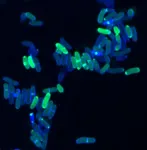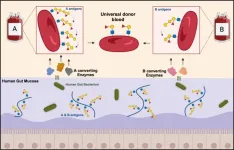(Press-News.org) The fragile qubits that make up quantum computers offer a powerful computational tool, yet also present a conundrum: How can engineers create practical, workable quantum systems out of bits that are so easily disturbed — and wiped of data — by tiny changes in their environment?
Engineers have long struggled with how to make quantum computers less error-prone, often by developing ways to detect and correct errors rather than prevent them in the first place. However, many such error-correction schemes involve duplicating information across hundreds or thousands of physical qubits at once, which quickly becomes hard to scale up in an efficient way.
Now, a team of scientists led by researchers at the Pritzker School of Molecular Engineering (PME) at the University of Chicago have developed the blueprint for a quantum computer that can more efficiently correct errors. The system uses a new framework, based around quantum low-density party-check (qLDPC) codes — which can detect errors by looking at the relationship between bits — as well as a new hardware involving reconfigurable atom arrays, which allow qubits to communicate with more neighbors and therefore let the qLDPC data be encoded in fewer qubits.
“With this proposed blueprint, we’ve reduced the overhead required for quantum error correction, which opens new avenues for scaling up quantum computers,” said Liang Jiang, professor of molecular engineering and senior author of the new work, published in Nature Physics.
Intrinsic noise
While standard computers rely on digital bits — in an on or off position — to encode data, qubits can exist in states of superposition, giving them the ability to tackle new computational problems. However, qubits’ unique properties also make them incredibly sensitive to their environment; they change states based on the surrounding temperature and electromagnetism.
“Quantum systems are intrinsically noisy. There’s really no way to build a quantum machine that won’t have error,” said Qian Xu, a PME graduate student who led the new work. “You need to have a way of doing active error correction if you want to scale up your quantum system and make it useful for practical tasks.”
For the last few decades, scientists have mostly turned to one type of error correction, called surface codes, for quantum systems. In these systems, you simultaneously encode the same logical information into many physical bits, arranged in a large two-dimensional grid. Errors can be deduced by comparing qubits to their direct neighbors. A mismatch suggests that one qubit has misfired.
“The problem with this is that you need a huge resource overhead,” said Xu. “In some of these systems, you need one thousand physical qubits for every logical qubit, so in the long run we don’t think we can scale this up to very large computers.”
Lowering redundancy
In their new system, Jiang, Xu, and colleagues at Harvard University, Caltech, University of Arizona, and QuEra Computing aimed to instead use qLDPC codes to correct errors. This type of error-correction had long been considered, but not implemented into a realistic blueprint.
With qLDPC codes, the data in qubits is not only compared to direct neighbors but also to more far-flung qubits. It allows a smaller grid of qubits to be used to achieve the same number of comparisons for error correction. However, this kind of long-distance communication between qubits had always been the sticking point in implementing qLDPC.
The researchers came up with a solution in the form of new hardware: reconfigurable atoms that can be moved with lasers to allow qubits to talk to new partners.
“With today's reconfigurable atom array systems, we can control and manipulate more than a thousand physical qubits with high fidelity and connect qubits separated by a large distance,” said Harry Zhou of Harvard University and QuEra Computing. “By matching the structure of quantum codes and these hardware capabilities, we can implement these more advanced qLDPC codes with only a few control lines, putting the realization of them within reach with today's experimental systems.”
When they combined qLDPC codes with reconfigurable neutral-atom arrays, the team was able to achieve a better error rate than using surface codes with only a few hundred physical qubits. When scaling up, quantum algorithms involving thousands of logical qubits could be accomplished with less than 100,000 physical qubits — far more efficient than the gold-standard surface codes.
“There’s still redundancy in terms of encoding the data in multiple physical qubits, but the idea is that we’ve reduced that redundancy by a lot,” said Xu.
The framework is still theoretical, although scientists are rapidly developing atom-array platforms that move toward the practical use of error-corrected quantum computation. The PME team is now working to further fine-tune their blueprint and ensure that the logical qubits relying on qLDPC codes and reconfigurable atom arrays can be used in computation.
“We think in the long run this will allow us to build very large quantum computers with lower error rates,” said Xu.
END
New system boosts efficiency of quantum error correction
A new quantum computer designed by Pritzker School of Molecular Engineering researchers uses “reconfigurable atoms,” or qubits that are mobile, making them able to efficiently communicate with many different neighbors for error correction.
2024-04-29
ELSE PRESS RELEASES FROM THIS DATE:
Study suggests staying current with COVID-19 vaccinations helps combat emerging variants
2024-04-29
New research using live SARS-CoV-2 virus reveals an updated vaccine provides a strong immune response against previous strains and emerging variants.
The findings by researchers at Oregon Health & Science University, published in the journal Emerging Infectious Diseases, suggest a clear benefit in receiving updated vaccinations on a regular basis, especially among older people or those with underlying medical conditions.
“The virus is still circulating, it’s continuing to evolve, and it remains dangerous,” said co-senior author Fikadu Tafesse, Ph.D., associate professor of molecular ...
It’s all in the smile: Aston University-led research finds politicians can influence voters with facial expressions
2024-04-29
Dr Carl Senior identified two types of smile – affiliative and reward – given by political leaders during the last UK general election in 2019
The eventual winner, Boris Johnson, was found to display the affiliative smile, which acts to align voter behaviour
The study is the first to look at how supporters of election losers react to the eventual winner.
New research led by Aston University’s Dr Carl Senior has found that the type of smile used by a political leader can influence voters to support them and their political agenda.
There are many different types of smile, and the ...
Possible alternative to antibiotics produced by bacteria
2024-04-29
Many bacteria produce substances to gain an advantage over competitors in their highly competitive natural environment. Researchers at the University Hospital Bonn (UKB), the University of Bonn and the German Center for Infection Research (DZIF) have discovered a new so-called lantibiotic, namely epilancin A37. It is produced by staphylococci that colonize the skin and acts specifically against their main competitors there, the corynebacteria. This specificity is presumably mediated by a very special mechanism of action, which the researchers were able to decipher in detail. ...
Quantitative study assesses how gender and race impact young athletes’ perceptions of their coaches
2024-04-29
Quantitative study assesses how gender and race impact young athletes’ perceptions of their coaches
Across the U.S., there are over 8 million student-athletes in high school and college. Engaging in sports can contribute to physical, mental, and social benefits, and coaches can play a key role in student-athletes’ continued participation in sports.
A recent study led by UNC Greensboro’s Dr. Tsz Lun (Alan) Chu, published in Sport, Exercise, and Performance Psychology, examines how multiple aspects of a young athlete’s ...
Enzymes open new path to universal donor blood
2024-04-29
The quest to develop universal donor blood has taken a decisive step forward. Researchers at DTU and Lund University have discovered enzymes that, when mixed with red blood cells, are able to remove specific sugars that make up the A and B antigens in the human ABO blood groups. The results have been published in the scientific journal Nature Microbiology.
"For the first time, the new enzyme cocktails not only remove the well-described A and B antigens, but also extended variants previously not recognized as problematic for transfusion safety. We are close to being able to produce universal blood from group B donors, while there is still work to be done to convert ...
Gemini south reveals origin of unexpected differences in giant binary stars
2024-04-29
It is estimated that up to 85% of stars exist in binary star systems, some even in systems with three or more stars. These stellar pairs are born together out of the same molecular cloud from a shared abundance of chemical building blocks, so astronomers would expect to find that they have nearly identical compositions and planetary systems. However, for many binaries that isn’t the case. While some proposed explanations attribute these dissimilarities to events occurring after the stars evolved, a team of astronomers have confirmed for the first time that they can actually originate ...
Hornets found to be primary pollinators of two Angelica species
2024-04-29
Researcher Ko Mochizuki of the University of Tokyo discovered that two species in the genus Angelica are pollinated primarily by hornets. This overturns the conventional belief that Angelica species are “generalists,” meaning that there is not one primary pollinator but a variety of species. As hornets are rarely primary pollinators, the discovery also impacts future ecological research and conservation efforts. The findings were published in the journal Ecology.
White, small, open, secretes nectar and produces pollen: these are the kinds of flowers that many types of insects can reach ...
Aspirin vs placebo as adjuvant therapy for breast cancer
2024-04-29
About The Study: In this randomized, placebo-controlled clinical trial that included 3,020 patients with high-risk nonmetastatic breast cancer, daily aspirin therapy did not improve risk of breast cancer recurrence or survival in early follow-up. Despite its promise and wide availability, aspirin should not be recommended as an adjuvant breast cancer treatment.
Authors: Wendy Y. Chen, M.D., of the Dana Farber Cancer Institute in Boston, is the corresponding author.
To access the embargoed study: Visit our For The Media ...
Association of new-onset seizures with SARS-CoV-2 vaccines
2024-04-29
About The Study: This systematic review and meta-analysis showed that the incidence proportion of new-onset seizures after SARS-CoV-2 vaccination was not statistically different between vaccine recipients and placebo recipients or unvaccinated participants in the pooled analyses of more than 118,000 participants in randomized clinical trials.
Authors: Churl-Su Kwon, M.D., M.P.H., of Columbia University in New York, is the corresponding author.
To access the embargoed study: Visit our For The Media website at this link https://media.jamanetwork.com/
(doi:10.1001/jamaneurol.2024.0967)
Editor’s Note: Please see the article for additional information, including ...
How can forests be reforested in a climate-friendly way?
2024-04-29
Europe's forests have already been severely affected by climate change. Thousands of hectares of trees have already died due to drought and bark beetles. Scientists from the University of Vienna and the Technical University of Munich TUM have now investigated which trees can be used for reforestation. Their findings: only a few tree species are fit for the future, such as English oak in the UK. However, mixed forests are important for the survival of forests, otherwise the forest ecosystem as a whole could be weakened. The results of the study were recently published in the renowned journal Nature Ecology and Evolution.
Although European forests are naturally home to a ...
LAST 30 PRESS RELEASES:
Duke-NUS scientists identify more effective way to detect poultry viruses in live markets
Low-intensity treadmill exercise preconditioning mitigates post-stroke injury in mouse models
How moss helped solve a grave-robbing mystery
How much sleep do teens get? Six-seven hours.
Patients regain weight rapidly after stopping weight loss drugs – but still keep off a quarter of weight lost
GLP-1 diabetes drugs linked to reduced risk of addiction and substance-related death
Councils face industry legal threats for campaigns warning against wood burning stoves
GLP-1 medications get at the heart of addiction: study
Global trauma study highlights shared learning as interest in whole blood resurges
Almost a third of Gen Z men agree a wife should obey her husband
Trapping light on thermal photodetectors shatters speed records
New review highlights the future of tubular solid oxide fuel cells for clean energy systems
Pig farm ammonia pollution may indirectly accelerate climate warming, new study finds
Modified biochar helps compost retain nitrogen and build richer soil organic matter
First gene regulation clinical trials for epilepsy show promising results
Life-changing drug identified for children with rare epilepsy
Husker researchers collaborate to explore fear of spiders
Mayo Clinic researchers discover hidden brain map that may improve epilepsy care
NYCST announces Round 2 Awards for space technology projects
How the Dobbs decision and abortion restrictions changed where medical students apply to residency programs
Microwave frying can help lower oil content for healthier French fries
In MS, wearable sensors may help identify people at risk of worsening disability
Study: Football associated with nearly one in five brain injuries in youth sports
Machine-learning immune-system analysis study may hold clues to personalized medicine
A promising potential therapeutic strategy for Rett syndrome
How time changes impact public sentiment in the U.S.
Analysis of charred food in pot reveals that prehistoric Europeans had surprisingly complex cuisines
As a whole, LGB+ workers in the NHS do not experience pay gaps compared to their heterosexual colleagues
How cocaine rewires the brain to drive relapse
Mosquito monitoring through sound - implications for AI species recognition
[Press-News.org] New system boosts efficiency of quantum error correctionA new quantum computer designed by Pritzker School of Molecular Engineering researchers uses “reconfigurable atoms,” or qubits that are mobile, making them able to efficiently communicate with many different neighbors for error correction.





